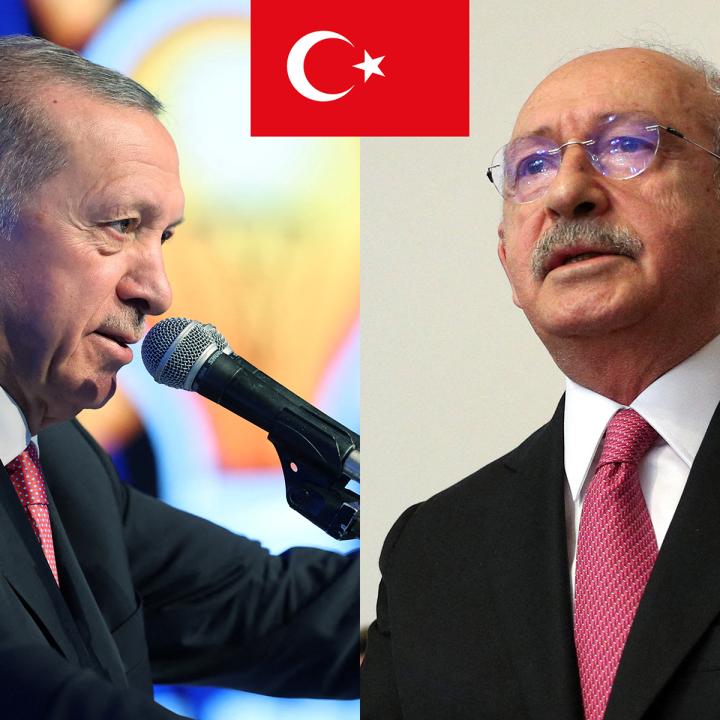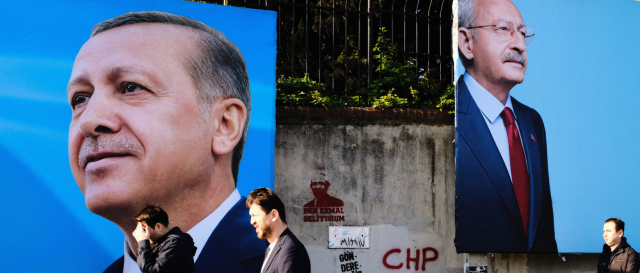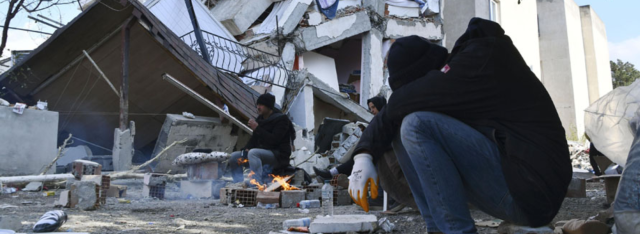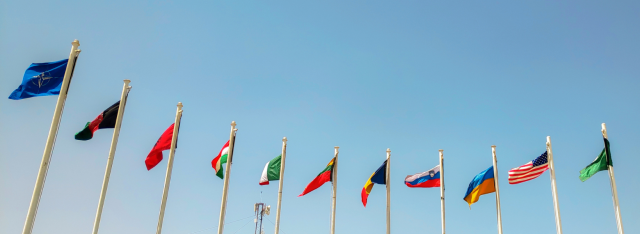
- Policy Analysis
- Interviews & Presentations
Turkish Elections 2023: End of an Erdogan Era?

In a series of articles, op-eds, videos and media appearances, Institute scholar Soner Cagaptay, as well as other Institute experts and contributors, map out possible outcomes, discussing what the elections mean for Turkey’s trajectory, NATO, the Middle East, and the rest of the world.
Turkey’s longtime president, Recep Tayyip Erdogan, faces an uncertain outcome when voters go to the polls this Sunday, May 14, in what is shaping up to be the most consequential vote in the country’s recent history.
Against a background of rampant inflation and the government’s botched response to the devastating February earthquakes, the united opposition sees the vote as its best chance to unseat Turkey’s increasingly autocratic ruler after two decades of rule.
The elections "are historic because either Erdogan will lose and two decades of rule by President Erdogan will come to an end,” said Beyer Family Fellow Soner Cagaptay to the Financial Times, “or he will win and stay in power so long as he’s alive.”
The outcome of the elections will have profound implications at home and abroad, including the future of Turkish democracy and the expansion of NATO, where Ankara is currently blocking Sweden’s membership.
In a series of articles, op-eds, videos and media appearances, Cagaptay, as well as other Institute experts and contributors, map out possible outcomes, discussing what the elections mean for Turkey’s trajectory, NATO, the Middle East, and the rest of the world.

Who is Erdogan?
Turkey’s Erdogan came to power two years after he founded the Justice and Development Party (AKP) in 2001. Since then, he has ridden consecutive waves of populist support to consolidate his power. As Cagaptay told The Guardian: “Erdogan has an image he’s cultivated in the last 20 years, it’s both sweet and sour: he’s autocratic, but effective, a patriarchal figure almost replacing what used to be called devlet baba, the fatherly state. This is why his base loves him and his opponents fear him.”
Erdogan likewise maintains impressive control over Turkey’s government, business, and media landscapes. Writing in Foreign Affairs, Cagaptay said that Erdogan “has also used his influence over the corporate sector to augment his power, with pro-Erdogan businesses now controlling nearly 90 percent of the Turkish media.” He has further demonized opposition parties and leaders by tying pro-Kurdish Peoples’ Democratic Party (HDP) to the Kurdistan Workers’ Party (PKK)—a terror-designated entity by Ankara and the U.S—and using the judiciary to harass the main opposition Republican People’s Party (CHP), other opposition parties, and civil society activists. Even with these many worries, Cagaptay told CNN that while the race has been “unfair” he believes that “the vote will be free.”
Who is the Opposition?
Speaking to the Jerusalem Post, Cagaptay said that the current opposition “has never been this close to winning the presidential election in the first round of voting on May 14.”
Who is this group that has a chance of standing in the way of Erdogan and his reelection?
"[The opposition] has never been this close to winning the presidential election in the first round of voting on May 14.”
The National Alliance, or “The Table of Six,” is composed of six parties, including secularists, conservatives, center-right, center-left, and Turkish nationalists. In an Institute Policy Note, Turkish analyst Seren Selvin Korkmaz writes that the group's approach is rooted in a strong alliance model as well as a plan for countering Erdogan’s polarizing politics.
The coalition is led by Kemal Kilicdaroglu, head of the social democratic CHP, who rose from humble beginnings through the Turkish bureaucracy before being elected leader of the party in 2010. By openly addressing his ethnic background as a member of the Alevi Kurdish minority, Kilicdaroglu has skillfully dodged Erdogan’s attempts to use identity politics against him, Cagaptay tells Al-Monitor. Seen as a mellow and depolarizing figure, the CHP leader has been equally successful in holding the disparate opposition together. “[He] has a unique ability to communicate with and unify different blocs,” writes Korkmaz.

The Impact of the Earthquake
Despite early expectations that Erdogan would be haunted by his government’s poor response to the February earthquakes, which took more than 50,000 lives and caused over $100 billion in damages, the president has used his extensive control of the Turkish media to spin his own narrative. As Cagaptay wrote in Foreign Affairs, Erdogan “effectively limited public debate of the earthquake, shifting the domestic discussion to Turkey’s industrial and military achievements under him.” The earthquake also presents a significant logistical challenge for some voters. At least 2 million voters were displaced but less than 200,000 have re-registered to vote.
The Election’s Effect on Turkish Foreign Policy
Turkish expert Alper Coskun described Erdogan’s foreign policy as a “puzzle whose pieces do not fit together.”
Moving away from the West and toward maligned powers like Russia through its ambivalent posture toward the Ukraine War has “narrowed Turkey’s circle of friends, increased its isolation, and weakened its diplomatic clout.”
"Turkey’s foreign policy under President Recep Tayyip Erdogan’s Justice and Development Party (AKP) has resembled a puzzle whose pieces do not fit together."
However, if the “Table of Six” were to win, they would reverse Turkey’s foreign policy direction. Speaking to Politico, Cagaptay said “Kilicdaroglu would seek to deepen ties with Europe and its trade relations.” Coskun likewise writes that the opposition would “strengthen Turkey’s hand in its engagement with the United States, the European Union, and other Western states in a way the AKP can no longer do.” When it comes to the Ukraine conflict, the new government would “embrace a platform that more closely aligns with the United State regarding the Ukraine War,” according to Cagaptay.
This would also mean that Turkey would aim to return to the U.S. F-35 Joint Strike Fighter program, after they were kicked out and “sanctions were invoked against Turkey after Ankara took possession of the Russian S-400 air-defense systems in 2020,” wrote Institute Taube Senior Fellow David Schenker and Goldberger Senior Fellow Grant Rumley in The Wall Street Journal. Although, this does not mean that Turkey would completely cut ties with Moscow, as it is one of Ankara’s key trading partners.
When it comes to Syria, Turkey continues to host about 3.7 million Syrians as tensions between refugees and Turks continue. Coskun writes that “facilitating the voluntary return of Syrians to their homeland has become a political priority in Turkey.” However, Cagaptay says that the Assad regime might be more willing to start fresh with a Kilicdaroglu government. “I actually think Assad is more eager to shake Kilicdaroglu’s hand than Erdogan’s hand,” he told Al-Monitor.

The Election and NATO
The Russian invasion of Ukraine impelled Sweden and Finland to apply together for membership in NATO. By opposing Sweden’s bid on the grounds that it provided support for Kurdish terrorist groups, Erdogan split the Nordic partners and allowed Finland’s accession to sail through. Cagaptay predicted that the president’s gambit would demonstrate to voters the respect accorded to Turkey – and to him.
As for Sweden’s bid, Cagaptay predicts that no matter which group wins, “unless the Swedes mess it up, [they] will probably get a green light from Turkey's Parliament to join NATO.” Speaking to The World, Cagaptay said that “Swedes agreeing to Turkey’s terms and looking like they have knelt down to Erdogan makes him look quite strong.”
Will this be Turkey’s Final Free Election under Erdogan?
"Either Erdogan will lose, giving Turkey a chance of restoring full democracy, or he will win and likely remain in power for the rest of his life."
Writing in Foreign Affairs, Cagaptay framed the election by saying: “The Turkish presidential contest may be the most consequential election this year. Either Erdogan will lose, giving Turkey a chance of restoring full democracy, or he will win and likely remain in power for the rest of his life.”
With threats of violence surrounding the election, and Erodgan’s grip over Turkish institutions remaining tight, the fear that Erdogan will install himself as “president for life” remains strong.
However, when speaking about Turkish democracy as a whole, Cagaptay remains optimistic. Speaking recently, he said, “I would not rule out the possibility of Turkey’s democratic resilience making a comeback. The most important thing for outside observers is to trust Turkey’s democracy.” Only time will tell if Turkey will be able to survive this challenge to its democracy or if Erdogan will once again come out on top.
Additional Resources
Washington Institute video
CNN video | May 2023
Upcoming Elections Could End the Erdogan Era
CNN's Zain Asher speaks with Cagaptay about the upcoming Turkish presidential contest.
Washington Institute Video
National Public Radio | May 2023
Earthquake Survivors Head to the Polls to Select Turkey's New President
Cagaptay appeared on NPR's The World to discuss how Turkey’s earthquake has affected the current election cycle.



